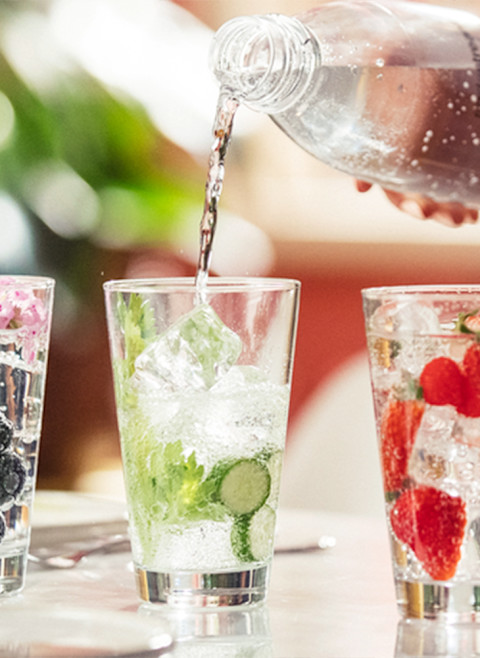The Eco-Friendly Kitchen: 5 Sustainability Hacks You'll Love

In the last 12 months, we've all spent extra time in our kitchens. We cooked, we organized, we reorganized, but did we go green?
With the kitchen being the hot spot of any household, it's a hub for a lot of waste. Nothing shows that quite like the recycling bin. For us, the major culprit of waste is single-use packaging, and, more specifically, sparkling water bottles. Luckily, SodaStream lets us indulge our sparkling water obsession without the excessive waste that comes with it.
Trading in our mountain of packaging for SodaStream was the first of many sustainable swaps we've been making to "greenify" our kitchens. We asked ourselves, if opting for SodaStream as our bubble source can so easily reduce waste—what other sustainable swaps are out there? Turns out...a lot. Here are five simple kitchen hacks to make your home just a little more eco-friendly.
Swap out bottles of sparkling water for SodaStream.

SodaStream carbonates plain tap water on the spot, making our lives instantly more sustainable. Single-use packaging, like plastic bottles, is a major factor in our global sustainability crisis: The World Economic Forum says that by 2050, there will be more plastic than sea life in the ocean. But SodaStream is on a mission to reduce single-use plastic waste, and we can help. Instead of cracking our second (OK, third) can of the day, SodaStream can refill reusable bottles at the push of a button. With infinite fizzy in your life, you'll quickly see how this countertop addition is a sustainability superstar.
Tackle messes with a reusable paper towel solution.
Paper towels are central to a clean kitchen. But while their convenience is unparalleled, they're not worth the waste. The EPA reports1 that the U.S. generates 3.8 million tons of tissue and paper towel waste in just a year. Because paper towels aren't recyclable, they go straight to a landfill, where they break down into methane—a greenhouse gas with 23 times the potency of carbon dioxide. We can start to remedy these staggering numbers if we swap for a reusable paper towel roll. Made out of materials like cellulose and cotton, these towels can be reused and eventually composted.
Choose a biodegradable sponge, and replace weekly.
Research has proved2 that bacteria rendezvous on the kitchen sponge more than anywhere else in our home, so it's recommended to change out sponges once a week. Bravo if you're already thinking about waste. To keep things clean and wasteless, choose a cellulose or organic cotton sponge—both of which are biodegradable. Instead of microwaving your sponge (which doesn't really work), you can simply machine-wash cotton sponges. Seems rational.
Compost to make a difference with your food waste.
We could go on about the benefits of composting, but here's the bottom line. Hard as we try to reduce it, food waste is a natural byproduct of being a human. Food scraps that go in the garbage, and then landfills, generate methane (again, not our friend). Composting reduces the overall impact of food waste3 while nourishing the soil for other green endeavors like gardening. And pro tip: When we compost, our trash doesn't get smelly so quickly.
Make your hot drink rituals waste-free.
With SodaStream, we can sustainably satisfy our cravings for bubbles and refreshment. But we all have our hot drink rituals of choice, too—and most of them result in unnecessary waste. Instead of using tea bags, most of which aren't compostable, use a tea strainer and loose tea blends. If you jive with java, swap the classic chlorine-bleached coffee filters for reusable coffee filters made of organic cotton. Rituals that benefit ourselves and the planet feel better from start to finish.
When sustainability is as simple as pressing a button.
The call for sustainability continues to grow louder. But we know that sustainability can feel like a big word, so where to start? Our answer is small steps. Inspired by SodaStream and their initiative to reduce single-use plastic waste, we've realized it's about doing what we can with what we have. Often, sustainability is simpler than we think, so press that SodaStream button, sip your bubbles, and get to swapping!
3 Sources
- https://www.epa.gov/facts-and-figures-about-materials-waste-and-recycling/nondurable-goods-product-specific-data#tab-6
- https://www.nature.com/articles/s41598-017-06055-9?utm_medium=affiliate&utm_source=commission_junction&utm_campaign=3_nsn6445_deeplink_PID100085446&utm_content=deeplink
- https://www.epa.gov/sustainable-management-food/reducing-impact-wasted-food-feeding-soil-and-composting#:~:text=Organic%20waste%20in%20landfills%20generates,the%20need%20for%20chemical%20fertilizers.&text=Compost%20enhances%20water%20retention%20in%20soils.

